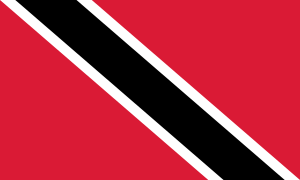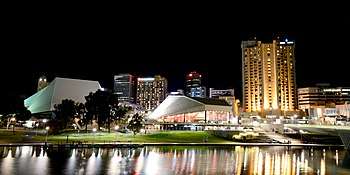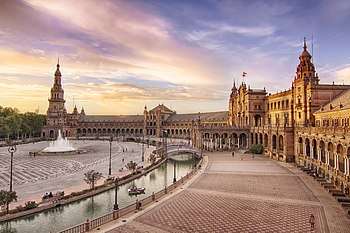City of Music (UNESCO)
UNESCO's City of Music programme is part of the wider Creative Cities Network.
The Network launched in 2004, and has member cities in seven creative fields. The other fields are: Crafts and Folk Art, Design, Film, Gastronomy, Literature, and Media Arts.[1]
Criteria for Cities of Music
To be approved as a City of Music, cities need to meet a number of criteria set by UNESCO.[2]
Designated UNESCO Cities of Music share similar characteristics:
- recognised centres of musical creation and activity
- experience in hosting music festivals and events at a national or international level
- promotion of the music industry in all its forms
- music schools, conservatories, academies, and higher education institutions specialised in music
- informal structures for music education, including amateur choirs and orchestras
- domestic or international platforms dedicated to particular genres of music and/or music from other countries
- cultural spaces suited for practicing and listening to music, e.g. open-air auditoriums.
About the cities
In March 2006, Seville became the first City of Music. Bologna joined approximately two months later.[3]
Seville has a "legendary Flamenco scene," with UNESCO listing Flamenco as an "intangible cultural heritage."[4]
Hamamatsu is the founding city of musical instrument companies Yamaha, Kawai, and Roland.[5]
Liverpool—"the city that spawned The Beatles" earned its accolade due to music's "place in the heart of the city's life." UNESCO also noted a "clearly defined" music, education, and skills strategy for young people.[6]
Idanha-a-Nova "lives by the rhythm of music," Ghent is a "city full of culture," and Auckland is the "beating heart of New Zealand's music industry."[7][8][9]
Varanasi is "sacred, soulful, spectacular," Daegu is a "pleasant and progressive place," and Seville "disarms and seduces."[10][11][12]
Cities of Music
There are forty-seven Cities of Music.
Nineteen of the participating cities are from Europe, ten are from Asia and the Middle East. South America and North America both have six and Africa has four whilst Oceania has two.
Seven countries have two member cities. Portugal and Colombia are the only countries to have three member cities
The Cities of Music are:
.svg.png)












.svg.png)

































References
- "Cities Join the UNESCO Creative Cities Network".
- "The Creative Cities Network" (PDF). Retrieved 2018-07-31.
- "UNESCO's Cities of Music".
- "Seville's Legendary Flamenco Scene".
- "Hamamatsu".
- "Liverpool receives 'City of Music' honour from UNESCO".
- "Idanha-a-Nova".
- "Ghent".
- "Auckland".
- "Varanasi".
- "Daegu".
- "Seville".
- "Adelaide".
- "Almaty".
- "Amarante".
- "Ambon".
- "Auckland".
- "Bogotá".
- "Bologna".
- "Brazzaville".
- "Brno".
- "Chennai".
- "Daegu".
- "Essaouira".
- "Frutillar".
- "Ghent".
- "Glasgow".
- "Hamamatsu".
- "Hanover".
- "Havana".
- "Idanha-a-Nova".
- "Kansas City".
- "Katowice".
- "Kazan".
- "Kingston".
- "Kinshasa".
- "Kırşehir".
- "Leiria".
- "Lliria".
- "Liverpool".
- "Mannheim".
- "Medellín".
- "Metz".
- "Morelia".
- "Norrköping".
- "Pesaro".
- "Port of Spain".
- "Praia".
- "Ramallah".
- "Salvador".
- "Sanandaj".
- "Santo Domingo".
- "Seville".
- "Tongyeong".
- "Valledupar".
- "Valparaíso".
- "Varanasi".
- "Veszprém".
- "Vranje".

